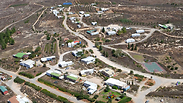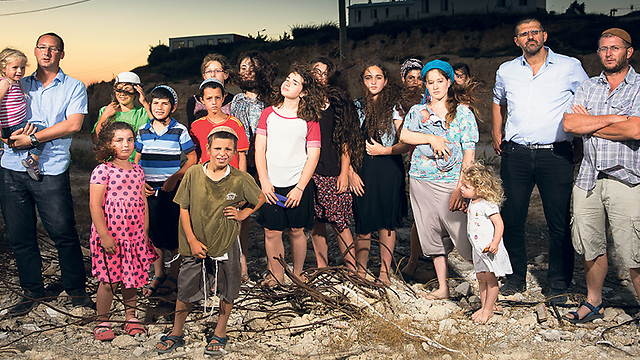
State requests to postpone Amona evacuation for 7 months
State Attorney's Office asks court for more time to examine alternative solutions for the outpost's residents; If the request is denied, the state says it is prepared to move forward with the evacuation in December.
Two years ago, the High Court of Justice (HCJ) ruled that the outpost must be evacuated and demolished after determining it was built on privately-owned Palestinian lands.
In its petition, the state claims it is seeking to carry out the evacuation peacefully and without incident, but that it is unable to provide alternative living solutions for residents within the next two months.
The state emphasized that if the court rejects the request, it will be prepared to carry out the evacuation by the date set in its ruling—December 25, 2016.
Among the alternatives mentioned was moving the settlers' homes to a site referred to as "Amona North" and another option was moving to Shvut Rachel, another settlement in the West Bank about an hour's drive away.
The state cited an opinion from the Shin Bet and the National Security Council saying the evacuation could have an effect on "security and diplomatic aspects in the entire area." The state said it would to present the top secret opinion to the court if required to do so.
Residents of Amona are strongly opposed to a relocation agreement. In a letter to Prime Minister Benjamin Netanyahu, residents said they intend to "mount a public, popular struggle—respectable and difficult—that would unite all of our supporters, both within the outpost and without. This will be the fight of our lives for our home."
Despite this objection, the State Attorney's Office wrote in its request to the court that "Different officials in the settler leadership, including senior officials, have expressed an agreement in principle to move Amona to a permanent location in eastern Shvut Rachel. For understandable reasons, we are unable to elaborate on those talks."
The request for eviction postponement comes after a flurry of activity surrounding Amona in recent weeks that was punctuated by a meeting between Defense Minister Avigdor Lieberman (Yisrael Beytenu), Prime Minister Netanyahu and Bayit Yehudi officials.
Legislators on the right-wing are pushing a so-called "regulations bill" that would legalize Amona and other illegal outposts in the West Bank. In its request for extension, however, the state emphasized it is not seeking to legalize the outpost in its current location.
"The attorney general expressed his opinion that there is a legal impediment to promote the above-mentioned bill proposal in light of the illegality it entails, being contradictory to international and national law," the State Attorney's Office wrote in the request.
Yesh Din, the legal NGO that represents the Palestinian land owners, said the extension request "is an insult to the law and an insult to the High Court. The court gave the state two years to prepare for the evacuation of Amona, precisely to avoid any last-minute political evasion attempts. The request provides no real reason to postpone the evacuation, and we hope the court rejects it quickly. The rejection of the request would allow the state to turn its efforts to what it should have been focused on—the enforcement of the law and returning the stolen lands to the legal owners, who are the residents of the Palestinian villages of Silwad, Ein Yabrud and Taibe."
MK Tamar Zandberg (Meretz) also slammed the state's request for postponement, saying "How absurd it is that a criminal government is requesting an extension from the court in an attempt to pass on its criminality. It's time the Netanyahu government stops with this Amona business; there is no point in rehashing this while we all know it is time to tell the settlers that we can't continue this criminality. It is time to put this fiasco behind us."











